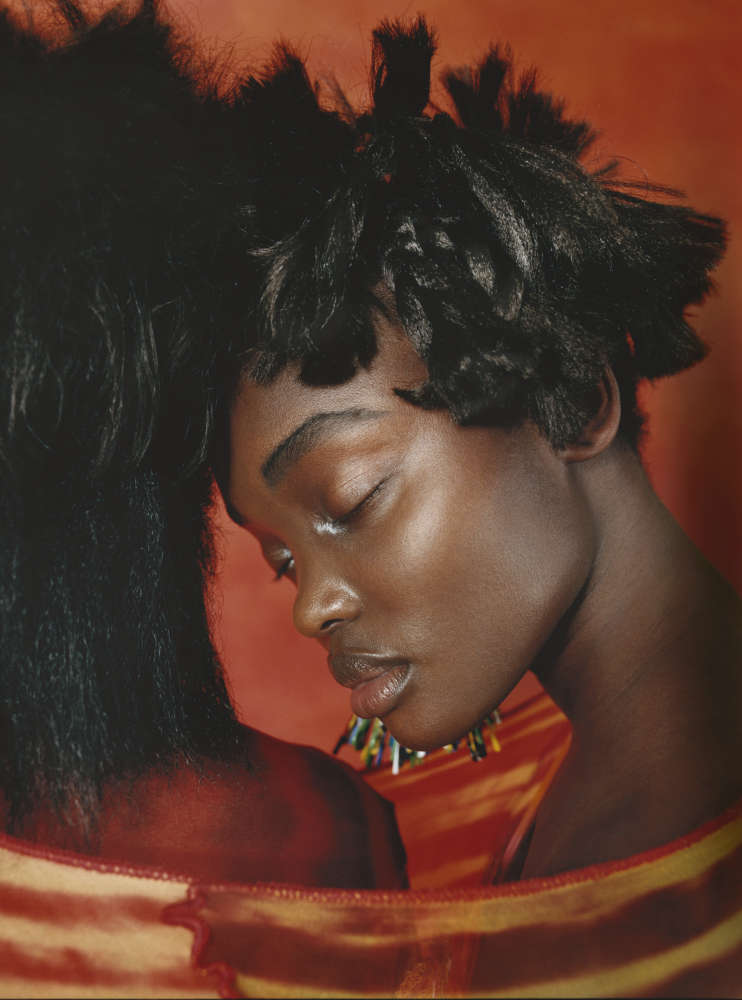
Photography – Nadine Ijewere for Nataal Magazine, Summer 2019
Sometimes, the simple act of just showing up and staying true to yourself, allows one to seamlessly claim one’s space and stake one’s claim in this industry. Hairstylist Cyndia Harvey has done more than just show up, she’s diversified the conversation on modern hair artistry and posed pertinent questions all while collaborating with artists like Tyler Mitchell, Ethan James Green, Oliver Hadlee Perch, and Tyrone Lebon. Newly represented by Art Partner, Mac Folkes sat down with Harvey exclusively for Models.com for a conversation on rebellious roots, the radical nature of natural hair, and how one’s access to a rarefied space can spark a revolution.
Editors – Betty Sze & Irene Ojo-Felix
Mac Folkes – Cyndia, first I want to start by proudly professing that I, too, am Jamaican-born.
Cyndia Harvey – What part of Jamaica are you from?
Mac – From Kingston mostly.
Cyndia – Okay. Amazing. Mandeville here.
Mac – I would be remiss if I didn’t ask what you thought about the kindred tribe of Jamaican rebels that seem to show up all over the world?
Cyndia – You know, it’s a conversation I have often with my Jamaican friends. It comes from a bit of a sad place. I was born in Jamaica and left when I was 11 years old. If you’re from a working-class family or below the poverty line in Jamaica you’re told, by your parents and the people around you, that everything outside of Jamaica is really promising. So everyone rushes to leave Jamaica and lands either in the United States or the UK. Jamaica, as a land, is rich in resources. We have sun, surf, and the ability to sustain ourselves because you can grow your food easily. Yet, there’s this underlying acceptance that there’s a dearth of opportunities. At least that’s how I grew up. That was kind of my motivation, or I should say, the motivation behind my mum wanting me to move to England. I still have a really strong relationship with Jamaica and I go back once a year. And each year, I feel a deeper need to reconnect. Going back is energizing and regenerative for me.
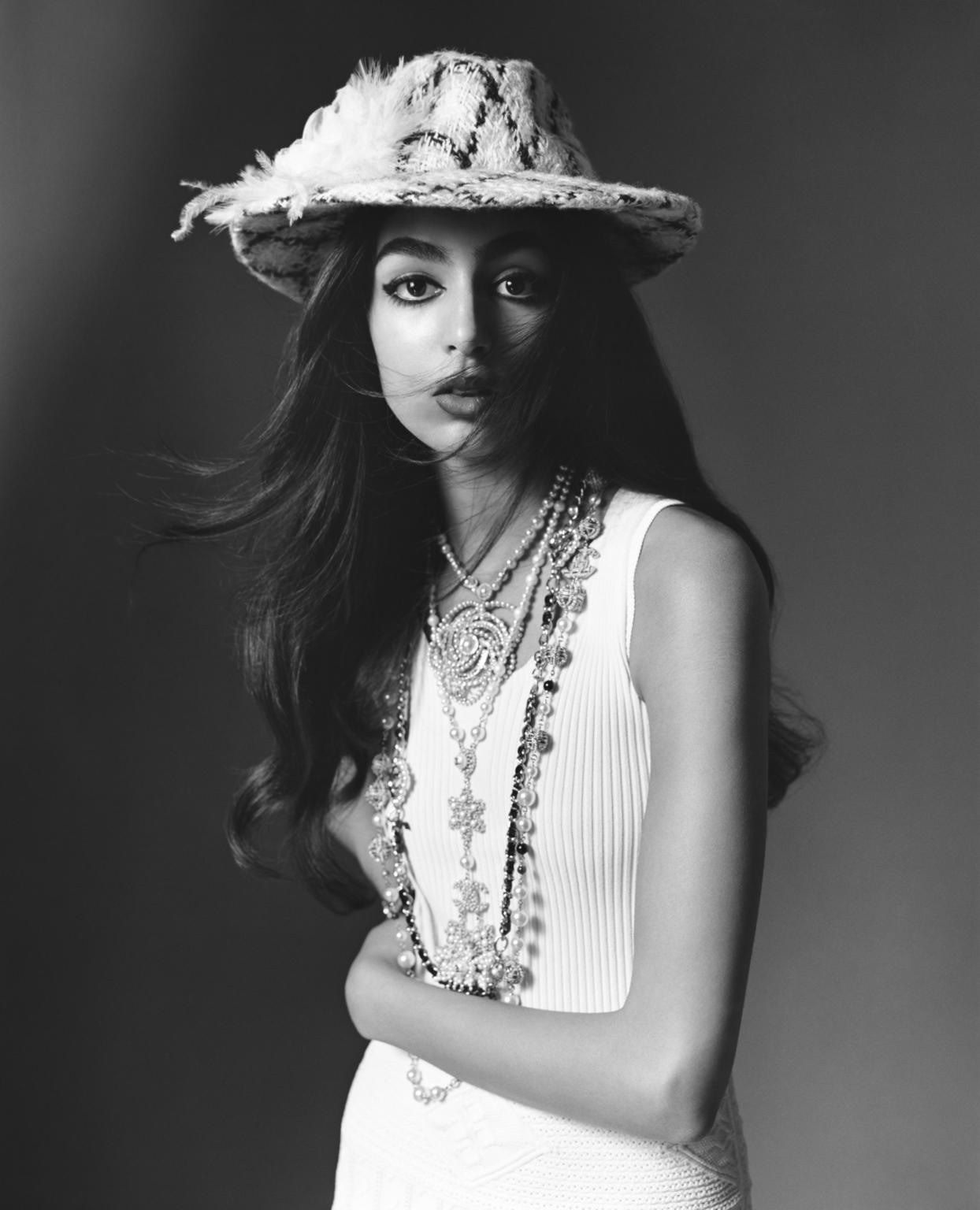
Photography – Oliver Hadlee Pearch for Vogue Italia, July 2019
Mac – I left when I was five years old, and I guess for much the same reason…a sense of opportunity and access to other worlds. I live in Berlin at the moment, and even now in the circles I travel, there are no shortage of Jamaicans.
Cyndia – Jamaica is such a special place in terms of the energy that the people carry with them worldwide. For instance… And you’re right, Jamaican communities are in every corner of the globe. But not just Jamaican communities, also communities beyond Jamaica that Jamaican culture has influenced. For instance in Japan there’s a huge dancehall scene. It’s fascinating that parallel subculture exists in a place like Japan. Not only because they are geographically so distant, but also because they are so culturally divergent.
Mac – Didn’t a Japanese girl actually win the major dancehall competition in Jamaica in the recent past?
Cyndia – Exactly! There’s her. I don’t know if you know the artist Jeremy Deller? Jeremy did this really amazing art piece, where he follows a Japanese dancehall enthusiast named Bom Bom on her journey to become the next dancehall queen. Check it out, it’s great and quite funny. Also, last Christmas I trekked with a couple of friends to the Everest Base Camp. I was at an altitude of 4,000 meters above sea level in a remote Sherpa community. They had two shops, and one of the shops was a souvenir shop dedicated to none other than Bob Marley.
Mac – You’re kidding?
Cyndia – I kid you not. Jamaicans have this really raw energy, there’s a lot of people who are struggling but they possess a special kind of energy that permeates whatever they do, wherever they go. I find, in any developing country; the people acquire happiness from a much deeper place than in material possessions. At the same time there’s an affluent demographic in Jamaica that has this same energy too.
Mac – I’ve given it much thought as well, and I think there’s an enduring quality that many of us possess: fearlessness.
Cyndia – Absolutely. I think we do everything with gusto and nothing is feared. I just think it’s a really unique place full of wholehearted individuals.
Mac – Does Jamaica influence your work in any way?
Cyndia – I can’t talk about Jamaica without acknowledging how growing up there informs my creativity. Culturally, Jamaicans are proud, playful, charismatic, colorful and bold. Self-expression is at the core of who they are. Having to make do with what you have is a breeding ground for creativity and I feel lucky to have been around that from a young age.
Mac – Can you give me a recap of your formative years as it relates to your future career?
Cyndia – My mum was a hairstylist so I grew up around hair culture. Within the black community, hair culture is a huge part of your life whether you’re interested in it or not. We grow up in between our mother’s legs, having our scalp greased, getting ready for the week ahead. Every Sunday I used to have these hours. It was the whole day which I think is fantastic. It’s a sacred space between women where you create. You’ve got to have your hair washed and you’ve got to spend a couple of hours in between your mother’s legs having your hair braided.
Mac – How did those memories propel you forward?
Cyndia – I grew up around hair culture and I’ve always really loved and enjoyed it. My mother owned a salon, so I used to go after school and had to wait a couple of hours for her to finish work. I used to watch her do hair and just for something to do I would help as I’ve always been quite an active child. I always liked building and making things. She used to run a training course for students. As I was already there, I’d just do the training with them and I thoroughly enjoyed it. That was my introduction to hair. I didn’t think about it as a career until I was around 17 or 18. I left the family home at 16 and went on to pursue art because I was always really interested. I wanted to do something quite academic and impressive because I wasn’t looking at hairdressing in that way.
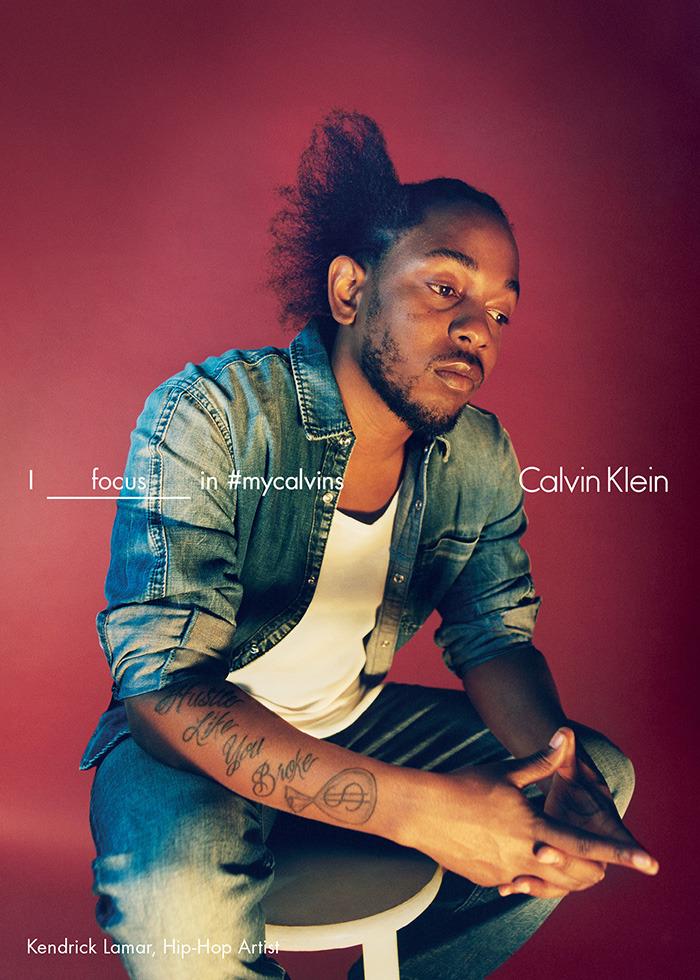
Photography – Tyrone Lebon for Calvin Klein, January 2016
Mac – I can also imagine being an immigrant with a hairdresser for a mother, that somehow you didn’t think of it as a step up.
Cyndia – Yes, exactly. In Jamaica, hairdressing isn’t a revered career. It’s not celebrated in that way. So I did art for about a year, and then realized, actually I don’t think this is what I want to do in the long run. Then, I worked in a salon in London specializing in Afro hair for about five years. It was working quite well and I moved up in the salon industry, winning a lot of awards and was able to travel. Imagine 18-year-old me, I went to Paris and I entered this competition and the prize was five thousand Euros…and I won!
Then I thought, okay, where else can I take this? At the time it had nothing to do with fashion. I didn’t even know how to get my foot in the door. I was sitting in my salon one day, and reading a magazine. It contained an interview with a session stylist who advised how to get started. I just followed what he said. I got in touch with some agencies, and eventually met Sam McKnight and did some shows with him. Eventually, I became Sam’s first assistant. I did that for years then started doing work on my own.
Mac – It’s a highly competitive industry. What would you say are the key values that have sustained you?
Cyndia – It is a very competitive industry, yes. Working so closely with Sam was my foot in the door and I’m so grateful for everything that I learned from him over those years. I’ve been fortunate to have met collaborators early with whom I’ve built strong creative relationships. Trust, communication, and collaboration are the fundamental things one needs to succeed in anything really, and in this industry those things are key. Passion too. I try to nurture and sustain these things with everyone I get the opportunity to work with.
Mac – Career highlights thus far?
Cyndia – I have lots of fond memories. My first Italian Vogue cover with Tim Walker, working with Mert Alas and Marcus Piggott for the first time, meeting Tyrone Lebon. I’d only worked with Tyrone Lebon a few times before working alongside him for two seasons of the Calvin Klein #mycalvins campaign. That was a really big moment personally and professionally. It was my first big campaign and Tyrone completely trusted me. Since then, we’ve collaborated on many other amazing projects.
“Trust, communication, and collaboration are the fundamental things one needs to succeed in anything really, and in this industry those things are key.”
Mac – You started by saying that it was doing hair, sitting down in between your mother’s legs and having her grease your scalp and braid your hair, was a sacred space. I’ve seen that sacred sensibility in much of your work. As a counterpoint, would you mind delving into the profane politics of black hair? There was recent legislation passed in California that said it’s illegal to discriminate against somebody for wearing their natural hair.
Cyndia – No one’s hair has ever been criticized or politicized as much as Afro hair has been. A lot of people didn’t even know that wasn’t a law, right? I hope this helps people understand why it can be upsetting when these hairstyles are celebrated on others and not respected on the originators. In 2016 I made the film, This Hair of Mine. It was inspired by a group of 12-year-old [South African] girls who were told by their school they could not wear “untidy Afros.” It made me think when I was that age, I didn’t have that kind of agency over myself to think, do you know what? That’s really wrong, and I’m not going to stand for this. They were little girls so proud of who they are and refused to let anyone tell them how they can and cannot be. So I think, yes, it’s a step forward to approve that law, but then there’s still work to be done because that law didn’t exist up until a month ago.
Mac – Do you find it as part of your mission to have the natural hair of black people accepted within the fashion industry?
Cyndia – It’s amazing to see afro hair and braided styles celebrated on the runway in recent years. In my work, I always push to expand on this and show how multifaceted textured hair can be. When I have a model with textured hair in the chair my mission is; how can I challenge the perception of what people expect this to be?
Mac – It’s funny, as you were speaking I just realized one thing. We’re the only people that our hair is referred to as a “natural hair.” Everyone else’s hair, is just that…hair.
Cyndia – You’re right. It’s because we’ve been hiding for so long, so now, natural hair takes on this whole other life. No, it’s just my hair. It’s completely normal and this is who I am and this is how it is.
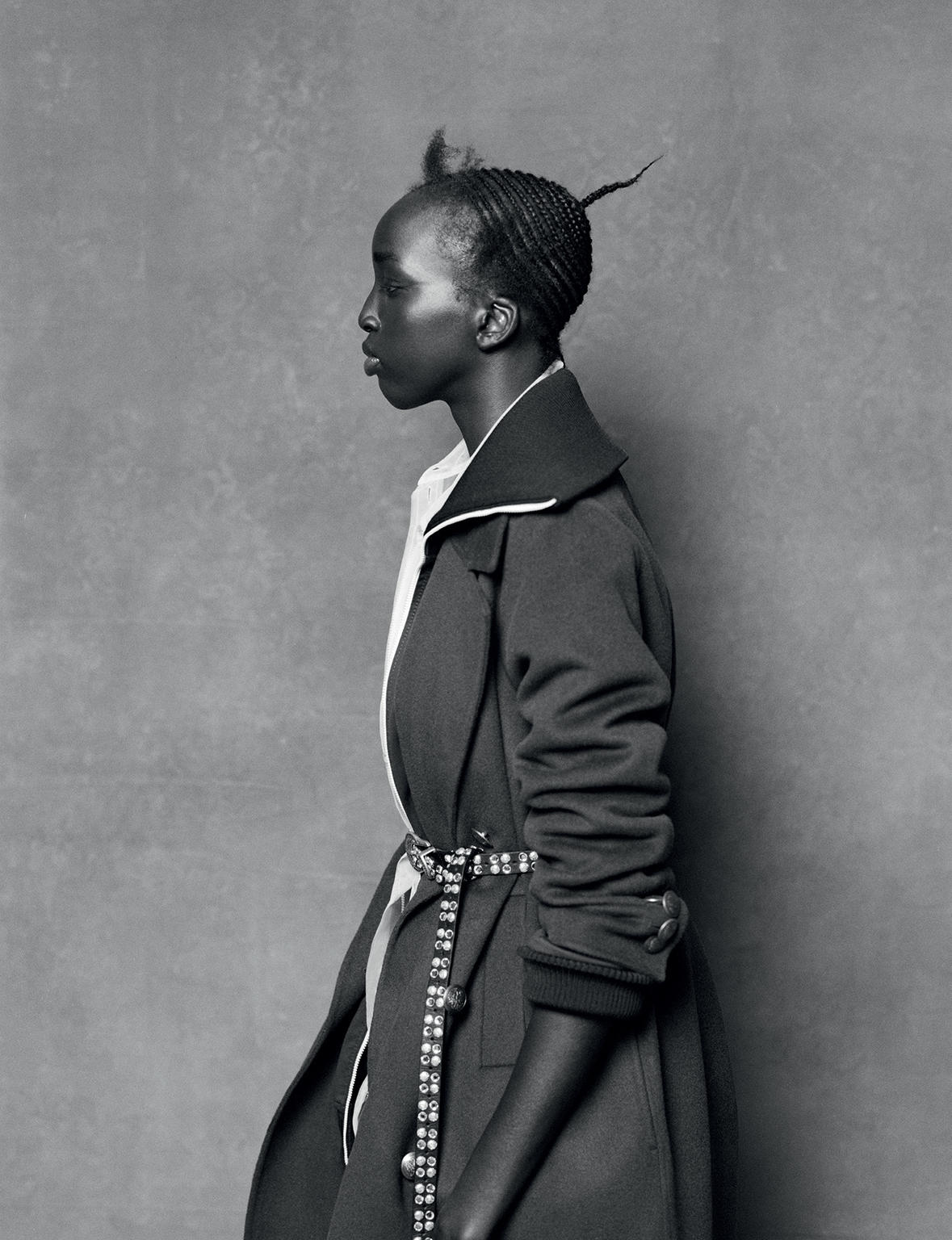
Photography – Campbell Addy for i-D, Winter 2018
Mac – I was involved recently with a museum show that is currently on view here in Berlin by the artist Theaster Gates. It’s called the Black Image Corporation, the show consisted of images from the archives of the Johnson Publishing Company, who were responsible for Ebony and Jet Magazines. Are you familiar with these magazines?
Cyndia – Ebony and Jet? Yes!
Mac – I was in there one day with a black woman who grew up in East Germany with no representation of black beauty. She came across this one image of a woman with a short, tight Afro. She remarked: “Oh, I wish I would have seen a picture like that when I was growing up.” Going through the exhibition the major theme through most of the issues from the 60s and 70s was “Black is Beautiful.” Pictures of beautiful black women with all kinds of afros and cornrows. Do you think that black people, and the world at large, believe that black hair is beautiful?
Cyndia – I can speak from my personal experience. There were times that I wasn’t comfortable with wearing my Afro hair. You are bombarded with a quantum stream of images of what is beautiful, what is accepted. We grow up believing that our hair is unmanageable and it needs to be tamed and it needs to be subdued. Even within our community some of us have been taught this. Our mothers grew up in a time with this messaging at the forefront of their psyche. They pass it down to you and then you grow up believing that. That’s why for a lot of women it’s a big deal.
Mac – I have never thought about it like this but as you said “it needs to be tamed, it needs to be subdued,” I couldn’t help but wonder if that sort of language feeds into the racist trope of blacks being savages?
Cyndia – I think subliminally or not so subliminally, that’s exactly what the message is.
Mac – Can you imagine a conversation about black hair that isn’t political on some, if not many levels?
Cyndia – Yeah. Even now, it’s so radical for me. It’s like this radical thing for me to wear my natural hair.
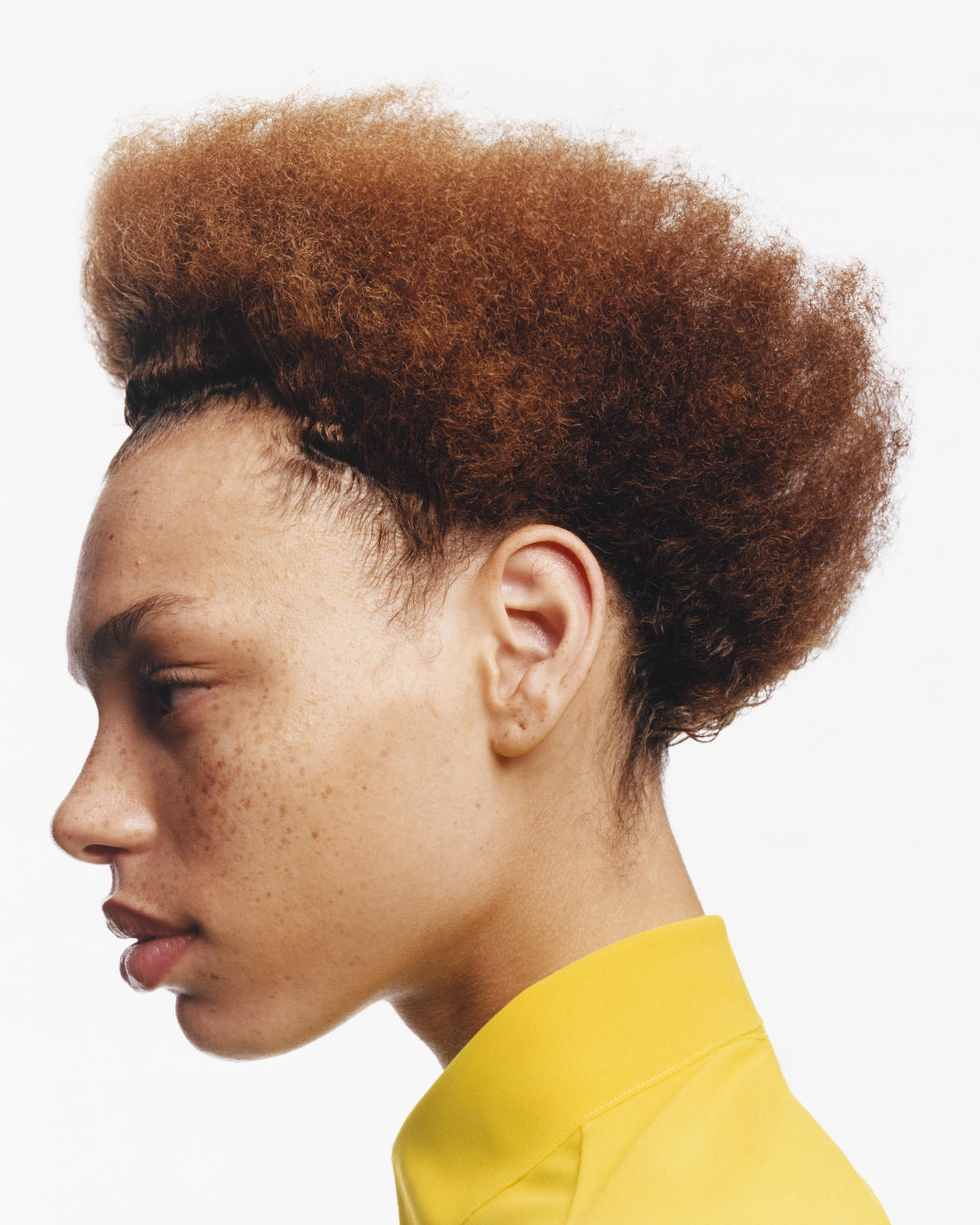
Photography – Oliver Hadlee Pearch for M Le Magazine du Monde, November 2018
Mac – How can we change that?
Cyndia – So many of my peers and collaborators are doing meaningful work that’s changing the face of fashion and it’s inspiring to be part of. Some may consider it a radical agenda, but everyone should carry this through authentically.
Mac – If you’re working in fashion at the level you’re working, you clearly know how to do straight hair. How many stylists do you feel know how to handle black textured hair?
Cyndia – Textured hair does require a completely different skill set. It’s different techniques, it’s different processes, it’s different products. It starts in the education process. When I did my hairdressing training, there was, in the curriculum, maybe one module on how to style Afro hair. Like one tiny sub-categorized module and that was it.
So many of my peers and collaborators are doing meaningful work that’s changing the face of fashion and it’s inspiring to be part of. Some may consider it a radical agenda, but everyone should carry this through authentically.
Mac – So even at the mainstream education level we are not considered?
Cyndia – Exactly. So a lot of people end up not knowing how to do this hair type. I feel, especially in fashion, where you are working with talents from all over the world, having a diverse set of hairstyling skills is doing your job well. I understand that some people choose to specialize in certain things. You might choose to specialize in cutting, you might choose to specialize in coloring, but I think to treat Afro hair as a niche, to treat an entire group of people as a niche, is seriously problematic.
Mac – Within the fashion industry, what kind of revolution are you hoping for?
Cyndia – My continued hope is to see diversity, in all forms, manifest and mature into an instinctive and innate way of being.
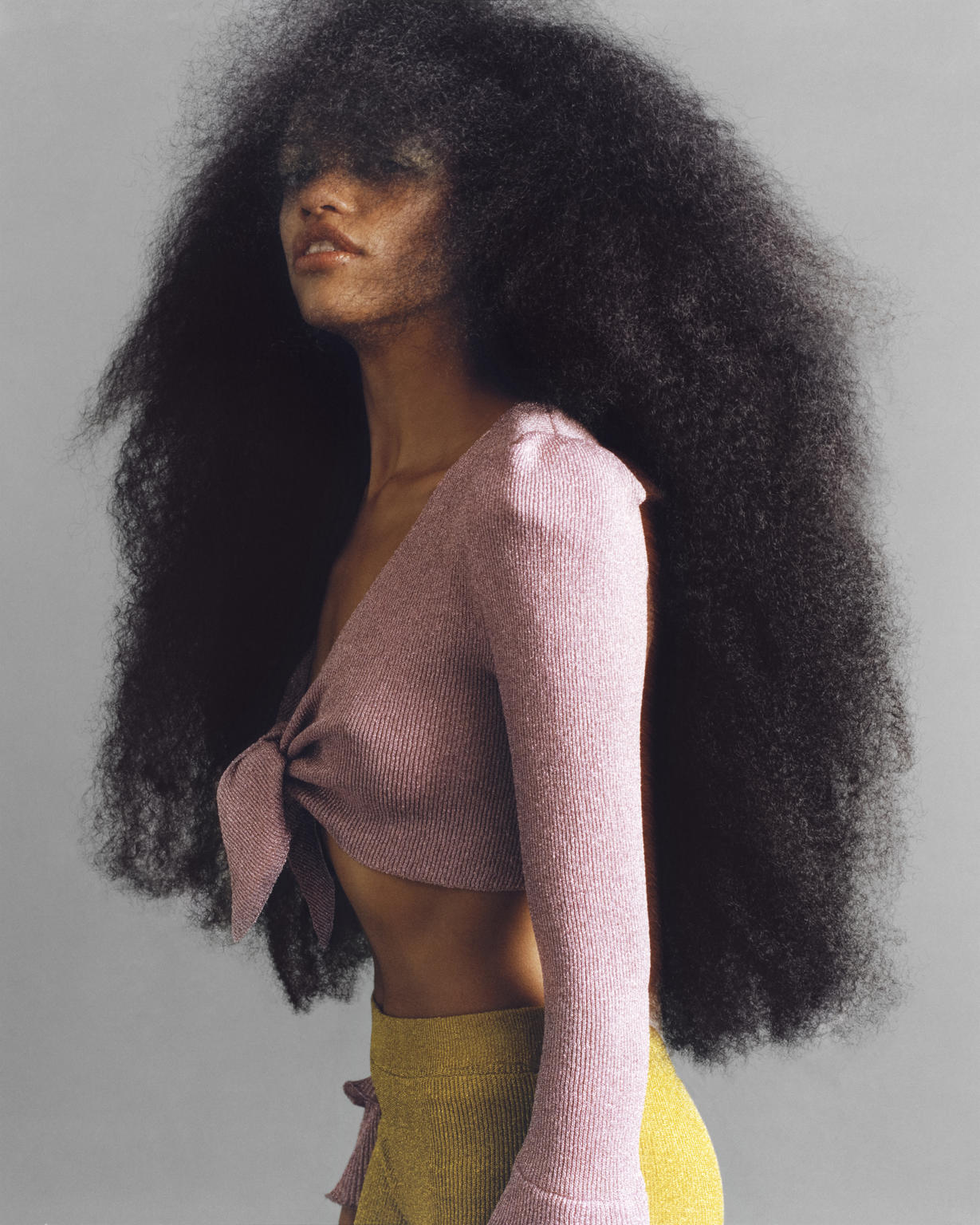
Photography – Oliver Hadlee Pearch for M Le Magazine du Monde, November 2018



